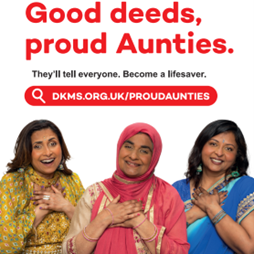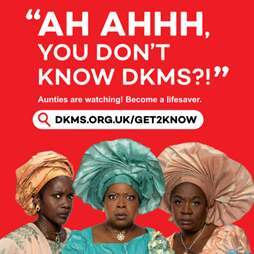Blood Cancer Awareness Month – listen to your Aunties!

 Are you on the Stem Cell Donor Register?
Are you on the Stem Cell Donor Register?
Every September, communities around the world unite to observe Blood Cancer Awareness Month, a vital initiative aimed at increasing understanding of blood cancers such as leukemia, lymphoma, myeloma, and other related conditions. These cancers affect the blood, bone marrow, and lymphatic system, and while they account for over 6–7% of all cancer diagnoses globally, they often remain under-recognized.

Blood cancers are often referred to as “invisible diseases” because they cannot be detected by sight or touch. Instead, diagnosis relies on lab tests and clinical evaluations. Raising awareness helps:
- Encourage early diagnosis, which can significantly improve treatment outcomes.
- Dispel myths and misconceptions.
- Provide patients and families with access to support resources and informed care options
Blood cancer is treated in various different ways – through chemotherapy, via targeted therapy, CAR-T cell therapy (were a patients T cells are genetically modified to better recognise and attached cancer cells), or via stem cell transplant – also known as bone marrow transplant, or by a combination of all of the above. Every year, over 2,000 people in the UK need a stem cell transplant but finding a compatible donor is incredibly difficult. Matches depend on tissue type, not blood type, and are most likely to be found within the same ethnic background. This means it’s not just about how many people are on the stem cell register, it’s about the diversity of registered donors too.
Unfortunately for people of UK minority ethnic heritage, it is it currently much harder to find a potentially lifesaving stem cell donor match. Of everyone currently registered as a potential stem cell donor in the UK, just 16% are from any UK minority ethnic background. DKMS now has 13 million potential donors register worldwide, but lack of diversity on the register means we still need more people to come forward. Now the DKMS Aunties are asking: what about you?
Request a swab kit to register as a stem cell donor
Types of Blood Cancer
Leukaemia: Affects white blood cells and disrupts the immune system. It can be acute or chronic.
Lymphoma: Begins in the lymphatic system and includes Hodgkin and non-Hodgkin types.
Myeloma: Impacts plasma cells in the bone marrow, often causing bone pain and anaemia.
Other types include Myelodysplastic Syndromes MDS and Myeloproliferative Neoplasms (MPN)
Recognizing the Symptoms
Early signs can be subtle but may include persistent fatigue, frequent infections, unexplained bruising or bleeding, swollen lymph nodes, weight loss
If you or someone you know experiences these symptoms, seeking medical advice promptly is crucial.
How You Can Get Involved
This September, there are many ways to support Blood Cancer Awareness Month:
- Educate yourself and others: Share facts and resources to help raise awareness.
- Participate in events: Join walks, webinars, or fundraising challenges.
- Donate: Support organizations funding research and patient care.
- Advocate: Use your voice to promote better healthcare policies and research funding.
- Support patients: Volunteer, send messages of encouragement, or connect with support groups
Looking Ahead
Thanks to ongoing research and advocacy, survival rates for blood cancers have improved by approximately 25% since the 1970s. But the journey continues. By staying informed and involved, we can help drive progress toward better treatments and, ultimately, a cure.
Saving lives through stem cells | Anthony Nolan
Blood Cancer UK | We’re here to beat blood cancer
Gill Edwards, WUN Advocate, Skewb Ltd.